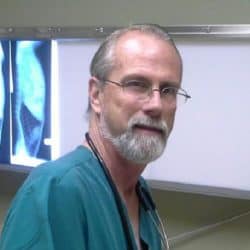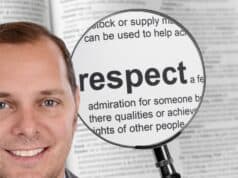I played host for a recent webinar that we're hosting on Monday, May 7, featuring a presentation by my friend Chip Ponsford, III, DVM (pictured at left), a veterinarian who has become quite a strong Lean advocate in recent years.
We've taught Lean together at a Veterinary Medicine conference (as I blogged about here), and I've been collaborating with Chip on his LeanVets.com blog.
Chip and I recently recorded a podcast that serves as an introduction and a preview to the webinar. A transcript follows of that podcast follows the recording video.
Webinar Recording:
Preview Podcast Transcript:
Mark Graban: Hi, welcome to the podcast. This is Mark Graban, a senior advisor with KaiNexus. I'm happy to be joined today with a Doctor of Veterinary Medicine, a friend of mine, Chip Ponsford, who is going to be presenting a webinar for us on Monday, May 7th, titled “Pets and Vets — Applying Lean in Unexpected Places.” You can register for that here.
I'm pleased that Chip is here today to give a bit of a preview. Chip, how are you today?
Chip Ponsford: I'm doing well, Mark. Thank you for having me.
Mark: Thank you in advance for doing the webinar. Can you introduce yourself for the audience a little bit about yourself and your professional background?
Chip: I'm a veterinarian. I graduated from Texas A&M in 1980. I owned and operated my own practice for about 27 years in El Paso, and then from there, sold my practice, went to work for a national corporate practice. I opened and started two veterinary hospitals for them in the El Paso area.
In 2012, I was one of the top 20 producers in the national corporate practice. I then moved to Dallas and I've been here since. I've been looking at Lean for quite awhile.
Mark: What piqued your interest in Lean? What was the serendipity that led to even stumbling across the ideas from Lean and the Toyota production system?
Chip: I have an intuitive connection to Lean. I didn't know what Lean was, of course, back then. I don't remember where I actually got the first hint of Lean. I do remember reading starting with Lean Thinking, The Machine that Changed the World, and of course, your book on healthcare [Lean Hospitals].
Everything that I read just was like an epiphany. I feel that way. That's the way I think. This is what I believe. From there, it's just been an epiphany. Just a total life-changer in the way I think about practice, and what I think that Lean can bring to veterinarians and veterinary practice.
Mark: I meet a lot of people who say what you said there, that Lean just seems to fit with the way you think, the way you work. I know a surgeon who made that connection. Dr. Sami Bahri who's sometimes labeled the “World's First Lean Dentist” had a similar discovery.
Do you think this Lean mindset that's intuitive to you is that part of what led to you being a top 20 producer? Did that mean that you had a subset of your practice that was more efficient and had better patient flow, that allowed you to see a higher volume of patients? What are your reflections on some of that?
Chip: I didn't know Lean back then. Lean came shortly thereafter. As I said, I think doctors and dentists and physicians, we're trained to be problem-solvers. Whether that's a sick animal, or whether it's a sick patient, a human patient, or whether it's a sick practice, the scientific process and the mindset and the culture that Lean asks you to do just fits. It just works very well.
I don't think that we as veterinarians look at our practices as being sick patients. What I'm trying to show my profession is this is not as complicated, or as weird, or as out-of-the-box as you think it is. We do this every day. We just have to extrapolate a little bit.
Mark: I think you'll be talking about this a little bit in the webinar. Can you give one example of, looking at Lean as a veterinarian, what sort of adaptations you have to make in language or practice, whether you're reading a book about the auto industry, or even my book, Lean Hospitals?
What I've learned is [the primary audience of my book] is sometimes referred to as “human healthcare” by people in veterinary medicine circles. What sort of leaps, or adjustments do you have to make? Is it really like you said earlier, it's all a process, it's all similar?
Chip: I think most of it is similar. I think if you want to connect with veterinarians, you need to talk their language, just like you need to be able to talk in any industry's language. Patient, for us, of course, it's the being there on the table that we're having to try and find the answer to the problem.
In veterinary medicine, we've got another person in that room every single time, and that's a human being. It's not the patient that makes the decisions. It's the human owner that makes the decisions and sometimes that creates some difficulties.
A patient, for me, means typically a dog or a cat. For lots of veterinarians, that's cattle, that's horses, that's sheep. It's chickens. It's multiple species. The process isn't the same. Your diseases are certainly different. Chickens don't have the same diseases and problems that a horse has, or that a cat has, it is a little bit different.
Again, I think by and large, problem-solving is problem-solving. What I like about Lean is that it takes a scientific approach to it. It works the same way that we work.
Mark: That's a great point. I hope listeners are looking forward to hearing you elaborate about that in the webinar that you're going to be doing. Again, the live webinar is on Monday, May 7th, at 1 PM, Eastern. If you're listening to this and you're not able to attend live, I'd encourage you to register anyway. You can do so, again, at KaiNexus.com/webinars.
If you attend live, you'll get to ask questions. We'll do Q&A at the end. If you can't attend live, we'll send you a link to a recording and the slides. I think there's a lot of people listening and attending the webinar who, whatever industry they work in, are struggling with these questions around we're different.
“We don't build cars.” How do we apply Lean and understand the elements of problem-solving, and leadership, and improvement that are very transferable, as our guest here today, Chip Ponsford, will be discussing on the webinar.
Chip, thank you for helping give a preview. Do you have a final thought you'd like to share with the listeners here today?
Chip: I think what we're going to present here is we're in the embryonic stages of trying to get this into veterinary medicine. I think maybe the problems and the difficulties and the frustrations that I'm having at trying to get this going certainly would be similar to any other industry that's trying to get a transitional philosophy, and a different culture and mindset ingrained in their people.
Mark: It's not easy at the early stages of adoption. We've heard that from previous webinar presenters about Lean in government, Lean in law firms. I feel like we're in the early days of the adoption of Lean in human healthcare.
Again, thank you, Chip, in advance for the webinar. Looking forward to it. Thanks for sharing some thoughts here with us today.
Chip: Thank you, Mark. Look forward to it.
Please scroll down (or click) to post a comment. Connect with me on LinkedIn.
Let’s work together to build a culture of continuous improvement and psychological safety. If you're a leader looking to create lasting change—not just projects—I help organizations:
- Engage people at all levels in sustainable improvement
- Shift from fear of mistakes to learning from them
- Apply Lean thinking in practical, people-centered ways
Interested in coaching or a keynote talk? Let’s start a conversation.










